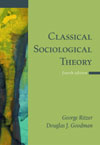
Karl Mannheim |  |
Learning ObjectivesAfter reading this chapter, students should be able to:
- discuss Mannheim's sociology of knowledge, including his theory of ideology;
- compare and contrast Marx's and Mannheim's understanding of ideology;
- understand the role of positivism and phenomenology, the distinction between relativism and relationalism, and the importance of Weltanschauung in Mannheim's work;
- understand the concepts and ideas discussed in Ideology and Utopia and be able to explain the differences between ideology and utopia and the dialectical relationship between them;
- understand the central importance of rationality and irrationality in Mannheim's sociology of knowledge and the different types of rationality and irrationality discussed by Mannheim;
- compare and contrast Mannheim's and Weber's views on the role of rationality in the development of society;
- understand how Mannheim applied his sociology of knowledge to social democratic planning; and
- discuss the critical assessment of Mannheim's sociological theory.
|
|